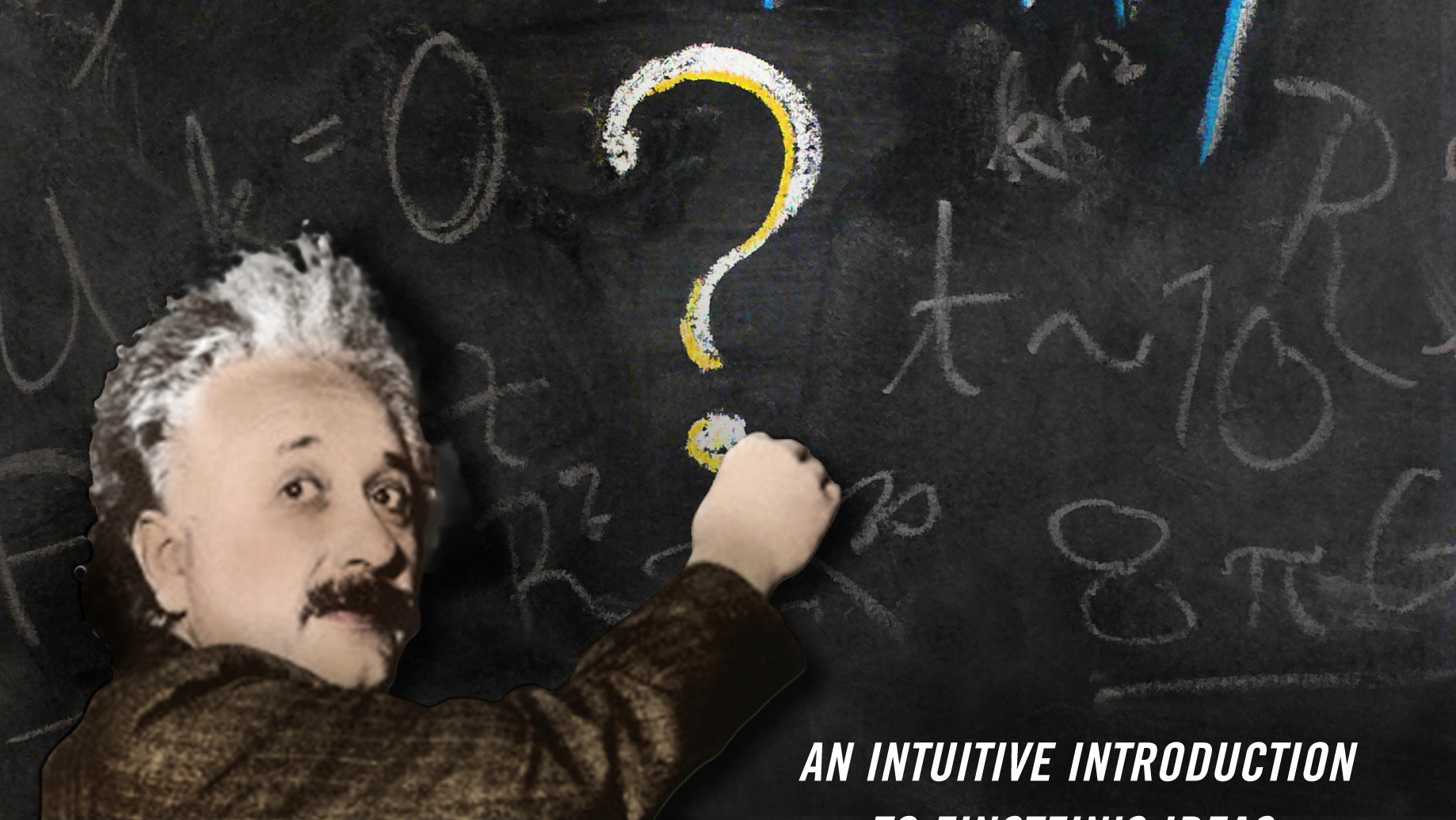
For example, e=mc2 explains how the sun shines. And it's at the root of how nuclear bombs and nuclear power work.
Understanding how doesn't have to be complicated, Boulder’s Jeffrey Bennett who tries to simplify Einstein's work in his new book, "What Is Relativity? An Intuitive Introduction to Einstein’s Ideas, and Why They Matter," says. Bennett is a science educator, astrophysicist and author in Boulder.
Q&A with Jeffrey Bennett
What is Relativity?
Nearly everyone has heard of Einstein’s theory of relativity, perhaps because it is so prevalent in popular culture. For example, relativity lies behind real science ideas like black holes and the expanding universe, and also behind science fiction ideas of things like warp drive, hyperspace and worm holes. The reason it comes up in these contexts is that the theory of relativity represents our current understanding of the nature of space, time and gravity. As such, it provides the foundation of almost all of modern physics and astronomy, which means it also plays a critical role in modern technology. To sum up, relativity tells us how the universe actually works, and through technology it comes up in nearly everything we do in our daily lives.
How does it gets its name? That is, what is “relative” about relativity?
Let’s start by dispelling a common misconception: Einstein’s theory does not say that “everything is relative.” Rather, the theory refers specifically to the relativity of motion. You can think of it like running on a treadmill: If the display says you are running 6 miles per hour, it means that is your speed relative to the rubber mat on the treadmill. Your speed is different if you measure relative to something else. For example, your speed relative to the exercise room is zero, because you’re running in place; your speed relative to the Moon is nearly 1000 miles per hour, because that is the speed at which Earth’s rotation carries you in a circle around Earth’s axis each day; and your speed relative to the Sun is about 60,000 miles per hour, because that’s how fast Earth moves in its orbit. Einstein’s theory gets its name because it describes how measurements of space and time differ for observers moving relative to one another.
You also say that “relativity” is in some sense a misnomer for Einstein’s theory, because the theory rests on foundations built from two absolutes. What are these absolutes?
The theory gets its name from the relativity of motion, but the fact that motion is relative had already been known for centuries. So the real foundations of Einstein’s theory lie in his assertion that two particular things in nature are absolute: (1) The laws of nature are the same for everyone; and (2) the speed of light is the same for everyone. All the astonishing consequences of relativity can be derived from these two absolutes, both of which have been verified by countless observations and experiments.
What are the consequences of relativity?
They are the things that relativity tells us that we would not have expected before Einstein’s work. I won’t list them all right now, but for example: Relativity tells us that if you observed people in a spaceship traveling by you at high speed, you’d find that their time was running slower than your time (meaning that they age slower than you), their spaceship is shorter than it would be if they were at rest relative to you and their mass is greater than it would be at rest.
You explain that Einstein actually published relativity in two parts: the “special” theory in 1905 and the “general” theory in 1915. What’s different about them?
The “special” theory gets its name because it applies to the special case in which we consider space and time without considering the effects of gravity. The general theory gets its name because it also includes gravity, which means it applies to a wider set of circumstances (which scientists call a more “general” set) than the special theory.
Why should ordinary people care about Einstein’s ideas now, 100 years after they were discovered?
Einstein’s ideas have been important to everyone for a long time, but unfortunately very few people have ever had a chance to learn about them. So their 100th anniversary seems as good a time as any to try to bring more people up to speed. As to why people should care, I like to focus on four particular reasons:
- Einstein’s theories underlie nearly all of modern science and technology; for example, modern electronics, nuclear power and even your GPS navigation all rely on them. This means that unless you know something about relativity, then you are using technology without understanding it — and while you are free to do this, I think it’s always better if you understand the tools that you use.
- As mentioned earlier, relativity provides our current understanding of the nature of space, time and gravity, and this nature turns out be somewhat different than we would expect from everyday life. So if you really want to understand what it means to be a human being, living on a planet that orbits a star in a vast universe, then you have to first understand the ideas of relativity.
- Relativity is astounding in both its implications and its basic simplicity, which I think makes Einstein’s work a shining example of what human beings can do when we put our minds to work for positive things rather than negative things.
- Relativity shows that there’s a permanence to what we call “spacetime” that, in my opinion, ought to affect they way we all behave toward one another; in fact, I think if everyone understood the ideas of relativity, we’d live in a better and more peaceful world.
You said above that relativity has “basic simplicity.” But relativity has a reputation for being very difficult. Which is it?
The conceptual ideas of relativity are somewhat counterintuitive, but they are not difficult to understand. All you need is an open mind and a willingness to follow some simple “thought experiments” through to their logical conclusions, and then to consider the evidence that shows these conclusions to be correct. As to why relativity has a reputation for being difficult: For the most part, it’s an undeserved reputation coming from the fact that it seems weird when you first study it. However, if you want to go beyond understanding the concepts and actually use relativity to test scientific ideas or design new technologies, then you need to work with the mathematics of relativity as well as with the concepts. The mathematics can become quite involved, especially for general relativity, and I certainly hope that some of my younger readers will be inspired to learn this mathematics — but don’t worry, you won’t find any of this mathematics in my book, which focuses only on the conceptual ideas.
You say that relativity can seem counterintuitive, but in the book you say it does not violate “common sense.” What do you mean?
By definition, we can only have “common sense” about things that we commonly experience, and the surprising effects of relativity are not noticeable under the conditions of our everyday lives. Instead, they become noticeable only at speeds much faster than we ever travel, or in gravity far stronger than Earth’s. In the book I use an analogy to “up” and “down.” In our daily lives, common sense tells us that “up” is over our heads and “down” is below our feet, and this common sense works fine for things like basketball games. But if that was all there was to it, then people on the other side of Earth would fall off. The fact that they don’t fall of therefore tells us that our common sense isn’t telling us the whole story. In a similar way, the fact that relativity tells us that we’d measure space and time differently at high speeds means that our common sense about motion must not be the whole story either, even though it works fine for most things in our daily lives.
Why don't black holes suck?
For some reason, it’s commonly assumed that if you went anywhere near a black hole, you’d be sucked in, or that if the Sun turned into a black hole then Earth would get sucked in. But it’s not true. At a distance, the gravity of a black hole is no different than the gravity of a more ordinary star, and you’d have to get extremely close to the black hole before you noticed any difference. Because black holes are so well known in popular culture, I decided that an imaginary journey in which we learned what would really happen on a voyage to a black hole would be a good way to introduce Einstein’s amazing ideas.
You said that relativity deals with gravity, but I thought Newton discovered the law of gravity. Did Einstein tell us something different?
Newton discovered the law of gravity, and it works so well — for example, we use it to calculate exactly how to send spacecraft to distant worlds — that we consider it to be part of a scientific theory of gravity. (Remember that in science, “theory” means something that has been repeatedly tested and verified.) But even Newton recognized that while his theory of gravity worked, it didn’t really explain why gravity worked that way. Einstein’s general theory of relativity gives us the explanation that Newton’s theory of gravity didn't, and even more important, it shows that Newton’s theory was not the complete story. Newton’s theory works really well in most cases, but it breaks down in conditions of very strong gravity or when we try to apply it to the universe as a whole. In that sense, Einstein’s theory is an expansion of Newton’s, because it applies to a wider range of situations than Newton’s theory. Still, it’s important remember that Newton’s theory was not “wrong,” because in most circumstances both theories give essentially the same answers.
So what does Einstein’s theory tell us that gravity actually is?
The short answer is that gravity is curvature of spacetime, but of course this short answer won’t mean much until you first learn what we mean by spacetime and how it can be curved. In fact, that’s a major reason why I wrote the book, so that you’d have a chance to understand what this short answer really means. As I’ve said, relativity is not difficult to understand, but I won't pretend that I can make it clear to you in just a few minutes. However, if you’re willing to spend enough time to read my short book, I’m confident that it will get you started on your way to a real understanding of space, time and gravity as Einstein showed them to be.
Why can’t we travel faster than the speed of light?
Again, I won’t pretend I can answer this question to your satisfaction in just a few minutes, but the basic answer, explained in detail in the book, is this: As we discussed earlier, relativity is built upon the fact that the speed of light is the same for everyone; that is, no matter how things are moving, everyone will always say that light is going the same speed of light — 300,000 kilometers per second (186,000 miles per second) — in space. The implication is that if you are in a spaceship, you’ll always see the light from your own headlights traveling away from you at this speed. This means that anyone looking at you will see that the light from your headlights is going faster than you are, and since everyone always measures the same speed of light, they’ll conclude that you are going slower than the speed of light. There’s no way around it.
Which science fiction movies & TV shows would you say most accurately portray space travel?
I like to point out that one reason you know that you really can’t go faster than the speed of light is that not even science fiction writers try to do it. Instead, because the speed of light is too slow for action movies about travel between the stars, science fiction writers look for loopholes in the laws of physics that might allow us to get from here to there faster than light would permit. They generally do this by inventing ways of bending or warping space (e.g., "Star Trek’s" warp drive) or simply leaving space (e.g., "Star Wars’" hyperspace) so that you are no longer subject to the rules that apply in ordinary space. These ideas are interesting because they don’t break any known laws of physics, but there’s also no reason to think they are actually possible. One idea that has a deeper grounding in real science is the idea of worm holes that “tunnel” through hyperspace to connect distant parts of the universe. The movie "Contact," based on the novel by Carl Sagan, did a nice job of using these.
E = mc2 is the most famous equation in history. Why is it so important, and what does it have to do with relativity?
E = mc2 is actually one of the discoveries that Einstein made as part of the theory of relativity; that is, it is one of the equations of relativity. In words, the equation states that energy (the E) is equal to mass (the m) times the speed of light (the c) squared. What this means is that under certain circumstances, mass can be turned into energy, or vice versa. This is important for many reasons, not least of which is that it explains how the Sun shines and how nuclear power and nuclear bombs work.









